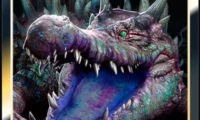The fiery-plumed Lystrosavis is omnivorous. Its inverted tusks assist this creature in digging for roots as well as rending meals of carrion!
Table of Contents
Lystrosavis belongs to the Tyrant Tier.
Classification
| RARITY | Unique |
|---|---|
| CLASS | Cunning Resilient |
| SIZE | Small |
| RELEASE VERSION | v2.18 |
| ANIMATION SET | Anomodont (Flock) |
Basic Stats (Lvl 26)
Level
26
HP
0
DMG
0
SPS
0

Health
3750

Damage
1350

Speed
131

Armor
0%

Critical
20%
Evolution Tree

Lystrosavis
┗

Lystrosuchus
┗

Lystrosaurus
┗

Einiasuchus
┗

Argentavis
Evolution Cost
- Coin For Leveling Up: 1,120,000
- DNA Lystrosavis: 3,000
- Coin For Fusing: 137,000
- DNA Lystrosuchus: 6,850
- Coin For Fusing: 62,400
- DNA Lystrosaurus: 15,600
- DNA Einiasuchus: 62,400
- DNA Argentavis: 68,500
Lystrosavis Resistances

DOT
33%

Reduced Damage
50%

Rend
33%

Stun
75%

Swap Prevention
50%
Reduced Damage: Resist strength: 50%
Damage reduction is less effective against Lystrosavis
DOT: Resist strength: 33%
Damage over time is reduced when applied against Lystrosavis
Stun: Resist strength: 75%
Lystrosavis has fewer chances of being stunned
Rend: Resist strength: 33%
Rend damage is reduced against Lystrosavis
Swap Prevention: Resist strength: 50%
Indonemys can’t be stopped from Swapping
Abilities

Debilitating Strike: Cooldown: 0.
Target: Highest Damage. Reduce Damage By 75.0% for 1 turn(s), 2 attack(s). Attack 1X (1350).

Evasive Restore: Priority. Delay: 1. Cooldown: 3.
Target: Self. Cleanse All Negative Effects. Increase Speed By 10.0% for 2 turn(s). 75.0% chance to Dodge By 67.0% for this turn, 2 attack(s). Rally Heal By 33.0% (1250).

Evasive Resilient Impact: Cooldown: 1.
Target: Self. Cleanse Reduced Damage.
Target: Lowest HP. Remove Dodge. Remove Increased Speed. Remove Cloak. Attack 1.5X (2025). Impose Vulnerability By 50.0% for 1 turn(s), 2 attack(s).
Target: Self. 75.0% chance to Dodge By 67.0% for 1 turn(s), 2 attack(s).

Evasive Alert Rampage: Secure: Delay: 1. Cooldown: 2.
Target: Highest Damage. Attack 2X (2700).
Target: Self. 100.0% chance to Dodge By 67.0% for 1 turn(s), 2 attack(s).
Threatened: (HP 33% or less(1250)): Delay: 1. Cooldown: 2.
Target: Highest Damage. Attack 2X (2700). 67.0% chance to Stun for 1 turn(s).
Target: Self. Automatic Swap.

Stunning Dodge And Strike
Target: Highest Damage. Bypass Armor. Attack 1X (1350). 50.0% chance to Stun for 1 turn(s).
Target: Self. Unable To Swap for 2 turn(s). 50.0% chance to Dodge By 67.0% for 1 turn(s), 2 attack(s).

Absorb – Flock: 3
Max damage received is remaining HP of flock member nearest defeat. Exception: Group attacks.
Stats by Level
| Level | Health | Damage | Speed | Armor | Critical |
|---|---|---|---|---|---|
| 26 | 3750 | 1350 | 131 | 0% | 20% |
| 27 | 3937 | 1417 | 131 | 0% | 20% |
| 28 | 4134 | 1488 | 131 | 0% | 20% |
| 29 | 4341 | 1562 | 131 | 0% | 20% |
| 30 | 4558 | 1640 | 131 | 0% | 20% |
Expertise
- Has Special Active Ability
- Has Special Passive Ability
- Has Swap In Ability
- Has Alert Ability
- Non-damaging Priority
- Rally Heal
- Automatic Swap
- Stun
- Bypass Armor
- Dodge
- Increase Speed
- Reduce Damage
- Impose Vulnerability
Trivia
Lystrosaurus was a genus of herbivorous synapsids that lived during the Late Permian period, around 260 to 250 million years ago. They were one of the most common land animals during this time and were found in what is now Antarctica, South Africa, India, and China.
Lystrosaurus had a unique body shape that was well-adapted to the harsh conditions of the Permian period. They had a barrel-shaped body, short legs, and a strong tail. Their head was large and triangular, with a beak-like snout that was used for biting and grinding vegetation. They also had sharp, peg-like teeth that were ideal for cropping tough plants.
Lystrosaurus was a quadrupedal animal, meaning it walked on four legs. They were relatively small, measuring around 1 to 2 meters in length and weighing around 50 to 100 kg. Despite their small size, they were able to survive in a variety of environments, including deserts and wetlands.
One of the most interesting things about Lystrosaurus is that they were able to survive the Permian-Triassic extinction event, which wiped out around 96% of all marine species and 70% of all terrestrial species. Scientists believe that Lystrosaurus’s ability to survive this mass extinction event was due to their ability to adapt to a wide range of environmental conditions and their ability to eat a variety of different plants.
Today, Lystrosaurus is considered a key species in the study of early terrestrial life and the evolution of synapsids. Their fossils are highly valued by paleontologists and can be found in museums and universities around the world.
Overall, Lystrosaurus was a remarkable animal that was able to survive one of the most devastating mass extinction events in Earth’s history. Its unique body shape and ability to adapt to different environments make it a fascinating subject of study for scientists and enthusiasts alike.









Leave a Reply